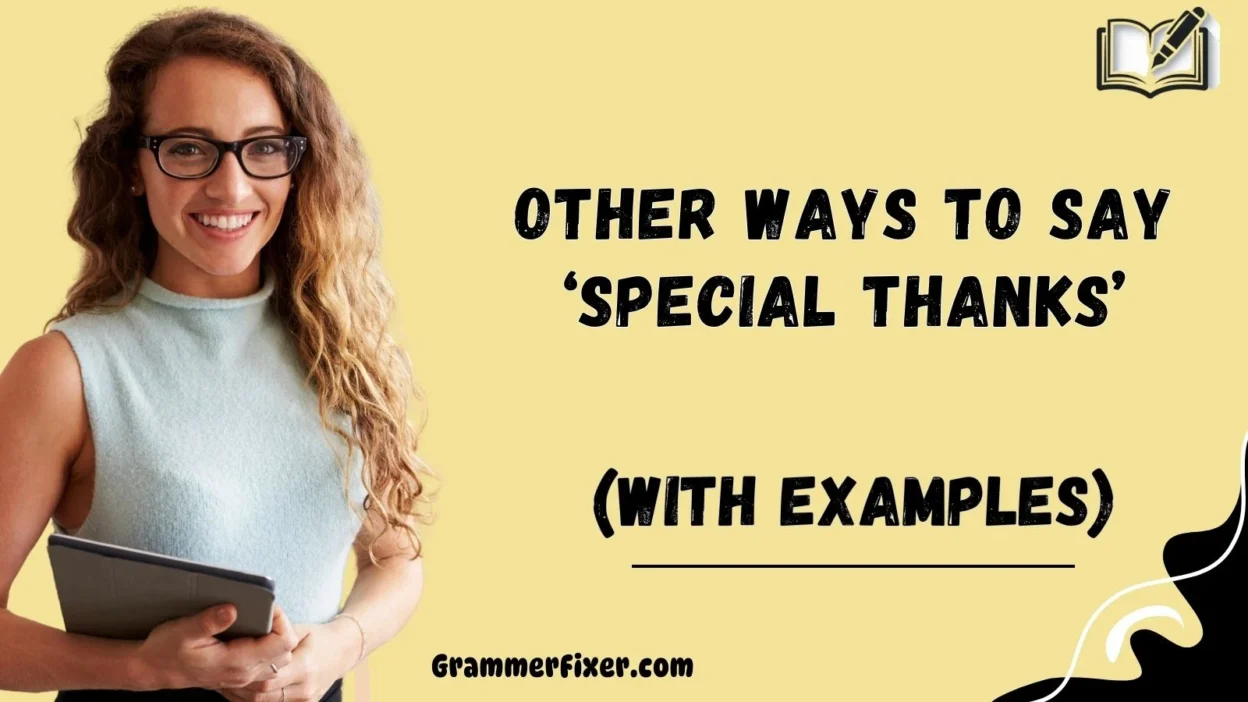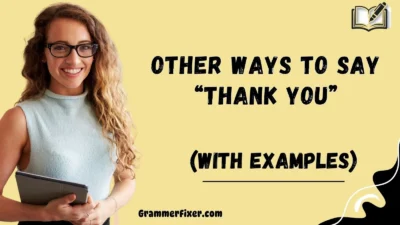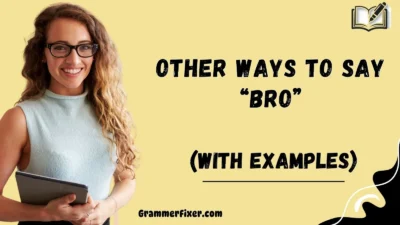Finding the right words of appreciation can make a huge difference in how your message is received. A simple “thank you” is nice, but sometimes it doesn’t fully capture the depth of gratitude you feel. That’s where alternatives to “special thanks” come in. Choosing more thoughtful expressions can make your message feel more personal, professional, and meaningful—whether you’re writing an email to a colleague, addressing a group in a formal speech, or acknowledging someone’s support in a project.
This article explores 30 formal synonyms for “special thanks” with meanings, scenarios, and examples to help you express appreciation with warmth, care, and elegance.
What Does “Special Thanks” Mean?
“Special thanks” is an expression used to convey extra acknowledgment of someone’s unique contribution, support, or effort. It goes beyond a simple “thank you” and emphasizes that the person’s actions had a significant and memorable impact.
When to Use “Special Thanks”?
You can use “special thanks” when you want to highlight someone’s extraordinary role in:
- Workplace projects
- Speeches and reports
- Events and ceremonies
- Emails and professional correspondence
It works best in formal or semi-formal contexts where you need to show respect and acknowledgment.
Is It Professional/Polite to Say “Special Thanks”?
Yes. It is both professional and polite. It fits well in business, academic, and formal writing. However, repeating it too often can make it sound generic, which is why synonyms and variations can give your words more freshness and sincerity.
Pros or Cons of Saying “Special Thanks”
Pros:
- Universally understood and professional
- Warm yet polite
- Works in both written and spoken communication
Cons:
- Can sound repetitive or generic if overused
- May lack emotional depth in sensitive scenarios
- Less personal than tailored alternatives
1. Heartfelt Gratitude
Meaning: Deep and genuine appreciation.
Detailed Explanation: Conveys emotional sincerity and emphasizes that the help made a profound impact.
Scenario Example:
“Please accept my heartfelt gratitude for your invaluable assistance during our project launch, Ms. Smith.”
Best Use: In formal speeches, heartfelt letters, and workplace acknowledgments.
Worst Use: For everyday casual conversations (e.g., texting a friend about buying coffee).
Tone: Warm, respectful, and genuine.
2. With All My Thanks
Meaning: A complete and wholehearted acknowledgment of support.
Detailed Explanation: Suggests that the thanks are total and unreserved.
Scenario Example:
“I present this award to you, Dr. Rivera, with all my thanks for your dedication and leadership.”
Best Use: In ceremonial settings, thank-you speeches, and notes.
Worst Use: In quick emails—it may sound overly dramatic.
Tone: Formal, sincere, and personal.
3. Profound Appreciation
Meaning: A deep and thoughtful acknowledgment.
Detailed Explanation: Suggests that the gratitude extends beyond simple politeness and carries weight and depth.
Scenario Example:
“On behalf of the committee, I extend our profound appreciation to Professor Johnson for his lifelong dedication.”
Best Use: In academic, professional, or community acknowledgments.
Worst Use: In casual workplace chats—too heavy for everyday use.
Tone: Reverent, formal, and dignified.
4. Sincere Thanks
Meaning: Honest and genuine gratitude.
Detailed Explanation: Shows that your message is authentic and not just a formality.
Scenario Example:
“I extend my sincere thanks to Olivia for her unwavering commitment to the team’s success.”
Best Use: In business emails and formal correspondence.
Worst Use: For lighthearted, playful contexts—it may sound too stiff.
Tone: Polite, professional, and earnest.
5. Deepest Gratitude
Meaning: A strong phrase expressing immeasurable appreciation.
Detailed Explanation: Often used when someone’s help was pivotal or life-changing.
Scenario Example:
“My deepest gratitude goes to Alex Taylor, whose expertise guided us through the launch.”
Best Use: In speeches, awards, and formal thank-you notes.
Worst Use: For minor favors—sounds exaggerated.
Tone: Elevated, solemn, and emotional.
6. Many Thanks
Meaning: A polite and slightly formal version of “thank you.”
Detailed Explanation: Cordial and professional without being overly emotional.
Scenario Example:
“Many thanks for your timely feedback on the proposal, Mr. Campbell.”
Best Use: In emails, workplace communication, and polite notes.
Worst Use: In highly formal speeches—it may sound too casual.
Tone: Cordial, polite, professional.
7. Special Recognition
Meaning: Public acknowledgment of someone’s unique effort.
Detailed Explanation: Best for highlighting a standout contribution.
Scenario Example:
“We would like to extend special recognition to Mark for his leadership during this crisis.”
Best Use: In ceremonies, reports, or formal speeches.
Worst Use: In personal letters—it can sound overly official.
Tone: Formal, respectful, and official.
8. Endless Thanks
Meaning: Suggests gratitude that is continuous and immeasurable.
Detailed Explanation: Often used to emphasize warmth and exaggeration in appreciation.
Scenario Example:
“I owe you endless thanks, Emily, for your hard work and dedication.”
Best Use: In personal notes, semi-formal letters, and heartfelt community acknowledgments.
Worst Use: In strictly professional documents—can sound too casual.
Tone: Warm, heartfelt, and expressive.
9. Immense Gratitude
Meaning: Overwhelming and significant appreciation.
Detailed Explanation: Suggests the enormity of someone’s contribution.
Scenario Example:
“I want to express my immense gratitude to Michael for stepping in during this challenging project.”
Best Use: In formal reports, project acknowledgments, or team speeches.
Worst Use: For small gestures—may sound exaggerated.
Tone: Formal, respectful, and impactful.
10. My Thanks To
Meaning: A direct and formal way of giving thanks to someone.
Detailed Explanation: Useful when you want to address a specific individual.
Scenario Example:
“My thanks to Dr. Rivera for her guidance during this process.”
Best Use: In formal documents, business emails, and acknowledgments.
Worst Use: In casual chats—it feels too stiff.
Tone: Polite, direct, and professional.
11. Special Appreciation
Meaning: Recognition of someone’s unique effort and contribution.
Detailed Explanation: Highlights that the person’s help went above ordinary expectations and deserves to be noticed.
Scenario Example:
“We extend our special appreciation to Samantha for her leadership during the product launch.”
Best Use: In professional acknowledgments, corporate events, and ceremonies.
Worst Use: For casual favors like borrowing a pen—it feels exaggerated.
Tone: Formal, respectful, and professional.
12. Endless Gratitude
Meaning: Gratitude that feels never-ending because of the significance of the help.
Detailed Explanation: Implies that the contribution was so meaningful that one thank-you isn’t enough.
Scenario Example:
“I offer my endless gratitude to Professor Johnson for his years of guidance.”
Best Use: In personalized letters, academic acknowledgments, and community speeches.
Worst Use: In short workplace emails—may sound overly poetic.
Tone: Heartfelt, elevated, and warm.
13. Cordial Thanks
Meaning: Polite thanks expressed with warmth and respect.
Detailed Explanation: Combines formality with kindness, often used in professional contexts.
Scenario Example:
“Please accept my cordial thanks for your invaluable input, Ms. Nora.”
Best Use: In formal workplace communication or emails.
Worst Use: In deeply emotional scenarios—it might feel too light.
Tone: Polite, warm, and professional.
14. Gracious Thanks
Meaning: Thanks expressed in a polite and elegant manner.
Detailed Explanation: Suggests appreciation delivered with humility and grace.
Scenario Example:
“I extend my gracious thanks to Derek Harper for his dedication to the committee’s goals.”
Best Use: In public acknowledgments, reports, and polite letters.
Worst Use: For informal chats—it feels unnatural.
Tone: Elegant, polite, and respectful.
15. Invaluable Thanks
Meaning: Thanks that match the immeasurable value of someone’s contribution.
Detailed Explanation: Used when someone’s role was so crucial that ordinary thanks feel insufficient.
Scenario Example:
“I want to offer my invaluable thanks to Connor for guiding the team through the crisis.”
Best Use: In formal project reports, business speeches, and team acknowledgments.
Worst Use: For small everyday favors—it will sound exaggerated.
Tone: Formal, strong, and reverent.
16. Sincere Gratitude
Meaning: Honest and genuine acknowledgment.
Detailed Explanation: Shows appreciation in a straightforward yet emotionally authentic way.
Scenario Example:
“My sincere gratitude to Emily for her unwavering support during this process.”
Best Use: In emails, letters, and personal thank-you notes.
Worst Use: In overly formal ceremonies—it may sound too casual.
Tone: Authentic, warm, and respectful.
17. Deep Appreciation
Meaning: A strong acknowledgment of someone’s dedication and effort.
Detailed Explanation: Highlights that the gratitude is genuine and deeply felt.
Scenario Example:
“We express our deep appreciation to George for his outstanding leadership in this project.”
Best Use: In business events, academic conferences, and formal settings.
Worst Use: For lighthearted, playful interactions.
Tone: Formal, warm, and professional.
18. Much Obliged
Meaning: A traditional and polite way of expressing thanks.
Detailed Explanation: Though slightly old-fashioned, it still conveys formality and respect.
Scenario Example:
“I am much obliged to Thomas for his timely advice.”
Best Use: In formal correspondence, old-style etiquette, or respectful gestures.
Worst Use: In modern workplace emails—it may sound outdated.
Tone: Polite, formal, slightly old-fashioned.
19. Distinguished Thanks
Meaning: Thanks delivered with special honor and distinction.
Detailed Explanation: Suitable for acknowledging contributions that stand apart as extraordinary.
Scenario Example:
“I extend my distinguished thanks to Dr. Rivera for her exemplary leadership.”
Best Use: In ceremonial speeches, awards, or community acknowledgments.
Worst Use: For routine tasks—too formal.
Tone: Elevated, formal, and respectful.
20. Warm Thanks
Meaning: Thanks expressed with kindness and friendliness.
Detailed Explanation: Adds a touch of personal warmth while still remaining polite.
Scenario Example:
“My warm thanks to Olivia for her collaborative spirit in this project.”
Best Use: In team communication, semi-formal notes, and workplace settings.
Worst Use: In strictly ceremonial speeches—it may feel too casual.
Tone: Friendly, kind, and professional.
21. Earnest Thanks
Meaning: Thanks expressed with sincerity and seriousness.
Detailed Explanation: Shows genuine acknowledgment while remaining formal.
Scenario Example:
“I extend my earnest thanks to Jamie for her invaluable guidance during the project.”
Best Use: In professional communication and speeches.
Worst Use: In informal group chats—sounds stiff.
Tone: Serious, formal, and heartfelt.
22. Endless Appreciation
Meaning: Appreciation that feels boundless.
Detailed Explanation: Suggests that the help received was so meaningful that one thank-you isn’t enough.
Scenario Example:
“I extend my endless appreciation to Mark for his dedication and persistence.”
Best Use: In personalized messages, heartfelt emails, and semi-formal contexts.
Worst Use: For short professional replies—too heavy.
Tone: Emotional, heartfelt, warm.
23. Reverent Thanks
Meaning: Thanks given with high respect and reverence.
Detailed Explanation: Appropriate when acknowledging someone highly esteemed or admired.
Scenario Example:
“With reverent thanks, we honor Professor Johnson’s lifelong contributions.”
Best Use: In academic tributes, memorials, and formal ceremonies.
Worst Use: In casual work settings—too formal.
Tone: Respectful, solemn, and formal.
24. True Appreciation
Meaning: Genuine and authentic gratitude.
Detailed Explanation: Adds clarity that your acknowledgment is honest, not perfunctory.
Scenario Example:
“I wish to express my true appreciation to Connor for his timely support.”
Best Use: In emails, speeches, and personal acknowledgments.
Worst Use: For extremely formal documents—may sound too casual.
Tone: Sincere, authentic, and warm.
25. Enduring Thanks
Meaning: Gratitude that lasts over time.
Detailed Explanation: Suggests that the help had a long-term impact that will not be forgotten.
Scenario Example:
“I extend my enduring thanks to Nora for her continuous support of our team.”
Best Use: In formal events, long-term acknowledgments, and lasting partnerships.
Worst Use: For short-term favors—it may sound excessive.
Tone: Formal, lasting, and genuine.
26. Elevated Thanks
Meaning: A phrase that gives thanks with a heightened sense of formality.
Detailed Explanation: Ideal when you want to express gratitude in a distinguished manner.
Scenario Example:
“We extend our elevated thanks to the committee for their dedication.”
Best Use: In board meetings, academic events, and community addresses.
Worst Use: In casual workplace exchanges.
Tone: Formal, polished, and respectful.
27. Grateful Recognition
Meaning: Acknowledgment paired with genuine thanks.
Detailed Explanation: Highlights both recognition and appreciation in one phrase.
Scenario Example:
“We give grateful recognition to Harper for his role in guiding this project.”
Best Use: In reports, official speeches, and written acknowledgments.
Worst Use: For informal chats—too heavy.
Tone: Formal, polite, and professional.
28. Countless Thanks
Meaning: Suggests that one thank-you isn’t enough.
Detailed Explanation: Adds emphasis by showing that the gratitude cannot be measured or counted.
Scenario Example:
“I owe you countless thanks, Elena, for your generous guidance.”
Best Use: In personal notes, community gatherings, and semi-formal letters.
Worst Use: In strictly formal documents.
Tone: Heartfelt, warm, and expressive.
29. Wholehearted Thanks
Meaning: Thanks given with complete sincerity.
Detailed Explanation: Emphasizes that the appreciation comes with full honesty and commitment.
Scenario Example:
“My wholehearted thanks to Chris for his selfless support.”
Best Use: In personalized emails, speeches, and formal notes.
Worst Use: In brief workplace messages.
Tone: Sincere, warm, and genuine.
30. Profound Thanks
Meaning: Thanks expressed with depth and seriousness.
Detailed Explanation: Stronger than “thank you,” this shows the help was significant and impactful.
Scenario Example:
“With profound thanks, we honor the extraordinary efforts of our team.”
Best Use: In formal speeches, dedications, and acknowledgments.
Worst Use: In casual interactions.
Tone: Formal, solemn, and respectful.
Conclusion
Expressing gratitude is an art that goes beyond a simple thank you. While “special thanks” is polite and professional, it can sometimes feel overused or generic. By choosing alternatives such as heartfelt gratitude, profound appreciation, sincere thanks, or enduring thanks, you add a layer of warmth, elegance, and authenticity to your message. Each synonym carries its own tone and nuance, making it easier to tailor your words to the situation—whether in a workplace email, a public speech, or a personal note. The right phrase not only acknowledges effort but also strengthens relationships, builds trust, and leaves a lasting positive impression. In the end, the true power of gratitude lies in its ability to make others feel valued, respected, and remembered.



